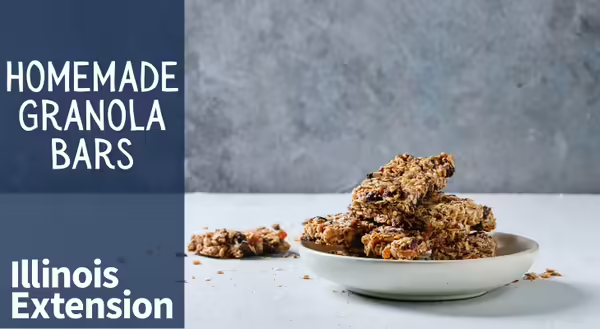
This blog post was written by Nutrition & Wellness intern, Kelley Herman.
Most people are used to going to the grocery store, cruising down the cracker and snack aisle, and picking up some granola bars or crackers for quick snacks in the future. These prepackaged options are helpful for snacking on the go and eating something during a busy day when a full meal isn’t an option, but they can contribute added sugars, sodium, and preservatives to a person's diet. For days with a little extra time, it can be beneficial to prepare some homemade versions of your favorite snacks to provide all the taste, with fewer hidden ingredients. Homemade variations can contain more whole grains, less sugar, and usually cost less to make than the store-bought versions.
One major benefit of making homemade snacks is being able to put whole grains in the recipes, rather than enriched refined grains, which are common in packaged products. Whole grains, which still contain the outer bran and the inner germ, provide many health benefits. They are good sources of dietary fiber, B vitamins, zinc, iron, magnesium, selenium, and vitamin E. These nutrients can provide health benefits like reducing constipation, lowering cholesterol, reducing the risk of type 2 diabetes, and helping the body absorb more nutrients overall. Whole grains such as brown rice, whole wheat, quinoa, whole oats, and rye, contain all of the original grain. The recipe below uses rolled oats, which is a type of whole grain. Steel cut oats and most instant oatmeal are also sources of whole grains.
In contrast, refined grains only contain the starchy endosperm. This endosperm section of the grain is softer, so it is more palatable for some people, but it is missing the two other parts of the grain which have the most nutrients. To combat this, many products add some of the missing nutrients back into the refined grain, which makes the grain “enriched”. Although these grains have some of the original vitamins and minerals back, the grains are still missing some nutrients and don’t have as high fiber content as whole grains. Examples of foods made with refined grains are white bread, white pasta, white rice, crackers, and some breakfast cereals.
Granola Bars
2 cups rolled oats
1/3 cup shredded coconut
1/2 cup honey
2 Tablespoons creamy or crunchy peanut butter
1 1/4 teaspoon vanilla extract
1/8 teaspoon salt
Preheat oven to 325F and grease a 9x9 baking dish. Spread the oats and coconut on the baking dish and toast in the oven until slightly brown, or about 8-10 minutes. Remove the oats and coconut and transfer them to a large mixing bowl. Mix all other ingredients (honey, peanut butter, vanilla, and salt) in a saucepan over medium-low heat and cook until ingredients become a smooth mixture. Pour the mixture over the oats and coconut in the bowl. Stir ingredients to coat and spread mixture evenly in the regreased baking dish. Bake granola bars 10-12 minutes, then cool completely before cutting into 8 equal rectangles.
Yield: 8 servings
Nutrition Facts (per serving): 190 calories, 6 grams fat, 60 milligrams sodium, 33 grams carbohydrate, 3 grams fiber, 4 grams protein
Source: Winchester Hospital. (2020). The whole scoop on whole versus refined grains. Winchester Hospital Health Library. https://www.winchesterhospital.org/health-library/article?id=28212